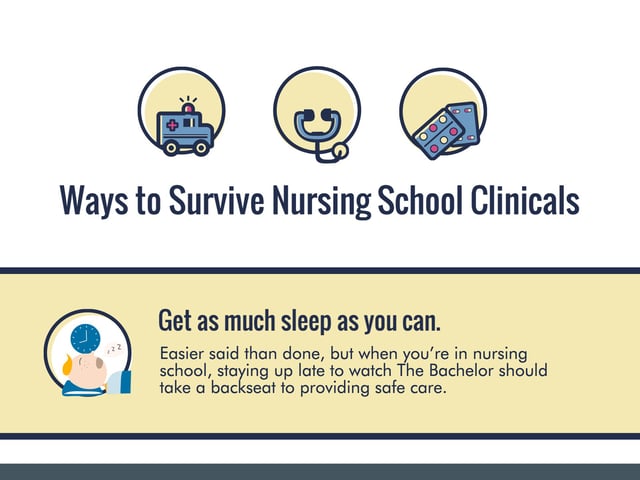
Ways to Survive Nursing School Clinicals
The nursing profession is renowned for its challenging but rewarding nature. It’s an arena where lifelong learning, resilience, and adaptability are not only encouraged but also expected. For pre-nursing students, the gateway to this thrilling career begins with excelling in the Test of Essential Academic Skills (TEAS). But the learning journey extends beyond passing the TEAS and entering nursing school. An equally crucial and often stressful part of the training is surviving the nursing school clinicals. This blog will outline some helpful strategies to manage this challenging but fulfilling part of your journey.
1. Get As Much Sleep As You Can
The Power of Sleep in Learning
The importance of sleep in a student’s life, especially those in rigorous programs such as nursing school, cannot be overstated. While the nursing curriculum can be demanding, and the pressure to study can often eat into your sleep schedule, it’s crucial to remember that adequate rest is not just a luxury—it’s a necessity for optimal cognitive function and overall well-being.
Sleep and Cognitive Function
Numerous studies have highlighted the impact of sleep deprivation on cognitive function. Lack of sleep can impair memory, reduce concentration, and hinder decision-making ability—all of which are essential skills for nursing students, particularly in a clinical setting. Whether it’s remembering details about a patient’s care plan, focusing on a complex procedure, or making split-second decisions, your cognitive functions are put to the test regularly, and they need the restorative power of sleep to perform at their best.
Building Healthy Sleep Habits
So how can you ensure you’re getting enough sleep amidst the busy and often unpredictable schedule of nursing school? The key lies in developing healthy sleep habits. This might mean saying goodbye to late-night TV shows or study sessions and hello to a more regular sleep schedule.
Try to establish a consistent sleep routine, going to bed and waking up at the same time every day. Make your sleep environment conducive to rest, with a comfortable bed, dark room, and quiet surroundings. Limit exposure to screens before bedtime, as the blue light can interfere with your body’s natural sleep cycle.
Also, consider incorporating relaxation techniques, such as deep breathing or meditation, into your nighttime routine to help prepare your mind for sleep.
2. Come Prepared
The Importance of Preparation in Nursing School
Success in nursing school, much like in the professional world of nursing itself, hinges on a well-established habit of preparation. A well-prepared nursing student shows commitment, professionalism, and a serious approach to their chosen career path. But it’s not just about making a good impression on your instructors and peers; being prepared can significantly enhance your overall learning experience.
Planning Your Care Plans
Care plans are a critical component of your nursing school requirements. They allow you to apply theoretical knowledge to practical scenarios, offering a comprehensive approach to patient care. Make sure your care plans are ready and well-thought-out before your clinical day. Review them thoroughly to understand the needs of your patient and the strategies you would need to apply. By preparing your care plans ahead of time, you equip yourself to provide excellent care and make the most out of your clinical experience.
Keeping Essential Tools and References Handy
In the dynamic world of nursing, various tools and references are your guides. Your drug reference book, for instance, is a critical companion. It provides you with crucial information about medications you will encounter during your clinicals, including indications, contraindications, side effects, and special considerations.
Having your stethoscope ready isn’t just about carrying it with you, but also about knowing how to use it effectively. Take the time to familiarize yourself with its operation and understand the various sounds you will encounter in patient assessments.
The Impact of Preparation on Your Clinical Day
Being prepared can make a significant difference in your clinical day. Instead of scrambling for resources or information, you’ll be able to focus on patient care and learning from the experience.
Being well-prepared can also reduce stress and boost confidence. When you’ve done the background work and prepared thoroughly, you can navigate the complexities of your clinical day with a clearer mind and a calmer approach.
3. Ask Questions
The Power of Inquiry in Learning
As a nursing student, it’s crucial to foster a sense of curiosity and inquiry. Asking questions is not just an indication of an active, engaged mind, but it is also a key strategy in mastering the complexities of nursing practice. Your journey through nursing school is fundamentally a learning process, and asking questions is an essential tool in facilitating this process.
Learning from Diverse Sources
In your nursing education, you will be surrounded by a wealth of expertise. From instructors who are seasoned in teaching nursing concepts, to practicing nurses and doctors who have real-life experiences and scenarios to share, each one offers unique learning opportunities.
Don’t hesitate to ask questions, no matter how basic or complex they may seem. Every question is a stepping stone to understanding a concept more deeply and strengthening your foundation in nursing. Whether it’s about an intricate disease process, a medication mechanism, the rationale behind a nursing intervention, or professional experiences and challenges, questions will help you to glean valuable insights.
4. Listen
The Role of Active Listening in Learning
Nursing school, like any significant educational journey, is an amalgamation of varied learning experiences. While active participation and asking questions are vital components of this process, equally important is the art of listening. It’s through listening that we absorb, process, and understand the vast array of information imparted to us.
Learning From Experts
From lectures by instructors to insights shared by practicing nurses and doctors, every interaction in nursing school is a potential learning opportunity. These individuals have a wealth of experience, knowledge, and wisdom that they’re more than willing to share. By actively listening, you open yourself up to absorbing this invaluable information.
Listening is more than just hearing words. It involves focusing on the speaker, understanding the information, and then processing and retaining it. Make it a habit to listen attentively in all situations - during lectures, while studying in groups, in practical sessions, or even during casual conversations with your peers and instructors.
The Power of Note Taking
While it’s important to actively listen, it’s equally important to reinforce your learning through note-taking. Not only does this practice help you remember what you’ve learned, but it also allows you to organize the information in a way that makes sense to you. You can highlight key points, draw diagrams, or make flashcards - whatever helps you learn best.
Remember, you’ll need to recall this information in different contexts, such as during exams, in practical sessions, and eventually, in your professional nursing practice. These notes will serve as your personal knowledge bank that you can revisit time and again.
Incorporating Feedback
Listening also plays a crucial role in personal growth and development. Constructive feedback from instructors, peers, or practicing professionals is an essential source of learning in nursing school. By actively listening to feedback, you can identify your strengths and work on your areas of improvement. This willingness to listen and learn from feedback demonstrates maturity, humility, and a commitment to lifelong learning - qualities that are highly valued in the nursing profession.
5. Answer What You Know
Active participation in your learning process is crucial during your nursing school journey. If a question arises during a lecture or a clinical scenario, and you know the answer, don’t hesitate to raise your hand. This involvement isn’t just about demonstrating your knowledge; it serves several key functions.
Firstly, it shows your instructors that you’re engaged in the material, understanding concepts, and ready to apply them. Secondly, it boosts your confidence. The positive reinforcement you get from answering correctly helps reinforce the material in your memory. Even if you answer incorrectly, it’s still a learning opportunity to correct misconceptions.
Lastly, it encourages a more interactive and dynamic learning environment. When you participate, it motivates your peers to get involved too. As a result, the whole class becomes a more collaborative and enriching experience.
6. Don’t Take a Break
Maximize Your Learning Opportunities
The clinical environment is bustling with learning opportunities. While it’s essential to take short breaks to maintain your focus and energy, consider these breaks as moments to recharge rather than disconnect completely.
In your downtime, it may be tempting to zone out or disengage. However, these can actually be valuable moments to enhance your learning. Observe what’s going on around you. Can you help another nurse with a procedure you haven’t seen before? Is there a patient interaction happening that you could learn from? Is there a chance to get involved in a medical conversation or procedure you’ve only studied in theory?
Engage with Your Clinical Environment
Take the initiative and ask your instructors if there are ongoing activities you could participate in or observe. They may guide you towards insightful experiences you might have overlooked. Actively seeking learning opportunities not only solidifies your academic knowledge but also helps you understand how theoretical concepts apply in real-life scenarios.
It also demonstrates to your instructors and peers that you’re motivated and eager to learn, which can significantly enrich your nursing school experience. Be proactive, engage with your clinical environment, and remember – every moment in nursing school can be a stepping-stone towards becoming a competent, confident nurse.
7. Be confident
The Importance of Confidence in Nursing
Confidence is a crucial characteristic for nurses. It’s the assurance that you can perform a given task or make a decision accurately and effectively. Your confidence instills trust in your patients, instructors, and fellow healthcare professionals, ensuring them that they are in safe and competent hands.
That being said, it’s also important to keep your confidence in check. Overconfidence can lead to complacency and potentially dangerous mistakes, especially in a sensitive field like healthcare where lives are often at stake. It’s a fine line to walk, but one that is essential for every nursing student.
Cultivate Confidence Through Practice and Knowledge
How does one cultivate the right amount of confidence? The first step is to trust in the skills you’ve acquired through your training. Every lecture attended, every practical lesson, and every clinical experience is an opportunity to learn and grow. When you’re about to perform a procedure or make a decision, remember the hours of study and practice you’ve put in. You’re well-trained, knowledgeable, and prepared.
However, in the vast world of healthcare, you’re not expected to know everything, especially as a student. This is where the beauty of ‘controlled confidence’ comes in.
Controlled Confidence: The Balance Between Assurance and Humility
Controlled confidence is about having the self-assurance to perform a task while also acknowledging the boundaries of your knowledge and skills. If you’re unsure of a procedure or a piece of information, don’t let your pride get in the way of seeking help.
If you’re about to perform a task and you feel uneasy, it’s okay to ask for assistance or a second opinion. This isn’t a sign of weakness, but rather a strength. It shows your commitment to providing the best care possible to your patients and your willingness to learn and improve.
In essence, being confident as a nursing student is not about projecting an image of infallibility, but about trusting your knowledge and skills while remaining open to continuous learning and growth. It’s about being self-assured enough to lead, humble enough to learn, and wise enough to balance the two.
Survive (and Thrive!) in Nursing School
Surviving and excelling in your nursing school clinicals is no small feat. It demands hard work, determination, focus, resilience, and adaptability. However, the challenges and rigors of clinicals also pave the way for immense learning opportunities and rewarding experiences that serve as the building blocks of your nursing career.
Incorporating these strategies—getting ample sleep, coming prepared, asking questions, actively listening, participating, maximizing learning opportunities, and fostering a balanced sense of confidence—can significantly enhance your nursing school journey. They will not only help you survive the tough times but will also ensure that you thrive and come out on the other side as a competent and confident nurse, ready to make a difference in the healthcare field.
Remember, nursing school is more than just about passing exams and meeting requirements. It’s about growing as an individual, developing a professional identity, and cultivating a lifelong commitment to learning, growth, and service. These strategies will help you navigate the journey, but ultimately, the key to success lies within you—your dedication, your passion, and your unwavering commitment to the noble cause of nursing.

Keep Reading

Test of Essential Academic Skills Blog
How to Pass the TEAS Science Section
As a pivotal component of the Test of Essential Academic Skills (TEAS),…

Test of Essential Academic Skills Blog
How Long Should I Study for the TEAS Test?
According to the Bureau of Labor, there are over 3 million registered n…

Test of Essential Academic Skills Blog
Making a Studying Plan for the TEAS Exam
Are you preparing to take the ATI TEAS exam? This important test can be…